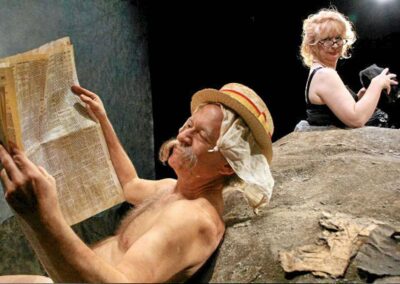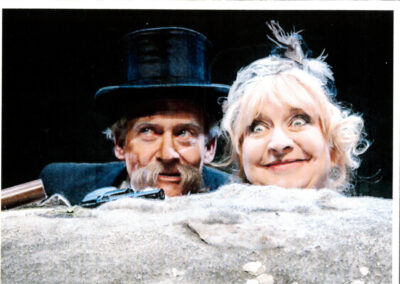Meet Beckett : Happy Days
Produced by the National Arts Centre and Theatre Columbus
Happy Days
Written by
Samuel Beckett
- Winnie Tania Jacobs
- Willie John Jarvis
- Director Leah Cherniak
- Playwright Samuel Beckett
- Set and Costume Designer Victoria Wallace
- Sound Designer Thomas Ryder Payne
- Projections DesignerTom Baranski
- Lighting DesignerJohn Munro
- Stage ManagerRobert Harding
- Assistant Stage ManagerLaura Baxter
- Production Managers Ryan McDougall, Ian Arnold & Bill Penner
- Producer Liz Jansen
- Mainspace Technician Peter Eaton
- Technical Coordinator, Carpenter Tom Baranski
Stuck in the ground, a woman goes on with her “Happy Day” with indefatigable hopeless human spirit, despite being pulled into the earth. A drawing room comedy in desperate, desolate circumstances. Winnie, as a role, is as coveted and challenging to an actor as playing Hamlet. It’s on every virtuoso’s “list”
The opening image of Happy Days is what we will look at for the entire play: Winnie, stuck up to her “diddies” in a mound of scorched earth. Horrible and hilarious. It is almost impossible to categorize Beckett, but the tragic/comic nature of his plays have always compelled me; the meeting ground of both laughter and desolation. This is the territory of true clown.
Beckett has an extraordinary sense of humour. It’s often dark humour, but it is inspired from his love of the low comedy charm and skills of Charlie Chaplin and Buster Keaton. There is much to be found of these silent film stars in Happy Days. The characters’ names are Winnie and Willie. (Willy-nilly? A dancing vaudeville team? The countless innuendos of their names.) Winnie has the clown’s dilemma: she cannot leave the stage. Beckett’s plays are unlike any others and defy comparison. He does not place his characters in a historical or recognizable setting. They exist in an unfamiliar place: an essential environment that has no decoration or familiar landmarks. All that is inessential is stripped away so that the play is like an event happening in a theatre in front of an audience. An audience is always more or less aware that they are in a theatre and Beckett doesn’t conceal but confronts this by weaving it into the fabric of the play. Perhaps this is to compel the audience to generate the “meaning” of the play.
Reviews and Awards
2010 Dora Award ~ Independent Theatre Division
- Nomination Outstanding Performance by a Female in a Principal Role – Tanja Jacobs
“Jacobs simply commands the stage with a lustily theatrical and fearlessly physical performance
– J. Kelly Nestruck, Globe and Mail
“Samuel Beckett wrote, “Nothing is funnier than unhappiness.” Theatre Columbus takes him at his word and has created the funniest production of his play Happy Days you are likely to see.”
– Christopher Hoile, Eye Weekly
“Jacobs is nearly flawless — with superb comic exaggeration of a sad clown, funny and sad at the same time, making her all the more pitiable.”
– Denis Armstrong, Sun Media, Ottawa
“Cherniak obviously set the bar high with this NAC production”
– The Ottawa Citizen


